AN UNCOMMON FRIENDSHIP

From Opposite Sides of the Holocaust
BERNAT ROSNER  FREDERIC C. TUBACH
FREDERIC C. TUBACH
with Sally Patterson Tubach
University of California Press Berkeley Los Angeles London
University of California Press
Berkeley and Los Angeles, California
University of California Press, Ltd.
London, England
2001 by
The Regents of the University of California
First paperback printing 2002
Library of Congress Cataloging-in-Publication Data
Rosner, Bernat, 1932
An uncommon friendship : from opposite sides of the Holocaust / Bernat Rosner & Frederic C. Tubach, with Sally Patterson Tubach.
p. cm.
ISBN 0-520-23689-0 (pbk. : alk. paper)
1. Rosner, Bernat, 1932-2. Tubach, Frederic C. (Frederic Christian), 1930-3. Jewish children in the Holocaust HungaryTabBiography. 4. Holocaust, Jewish (1939-1945)Hungary-TabPersonal narratives. 5. Tab (Hungary) Biography. 6. World War, 1939-1945 ChildrenGermanyBiography. 7. World War, 1939-1945Personal narratives, German. 8. Holocaust survivorsCaliforniaBiography. 9. GermanyBiography. 10. California Biography. I. Title.
DS135.H93 R67 2001
943.9'7dc21 00-053207
Manufactured in the United States of America
10 09 08 07 06 05 04 03 02
10 9 8 7 6 5 4 3 2
The paper used in this publication meets the minimum requirements of ANSI/NISO Z39.48-1992 (R1997) (Permanence of Paper). 
TO OUR CHILDREN

Michael Rosner
Andrew Rosner
Owen Rosner
Karen Tubach
Michael Tubach
ILLUSTRATIONS (following page 144)

Foreword
Two European boys from small villages, one Jewish Hungarian and one German, grew up on opposite sides of the deadly divide constructed by Nazi Germany. One barely survived his imprisonment in several concentration camps, while the other attended meetings of the Jungvolk (Pre-Hitler Youth). The father of one was exterminated at Auschwitz, while the father of the other was a counterintelligence officer in the German army. After the war, both youths followed their luck and drive, each in his own way, to leave Europe and cross the Atlantic. The transformative power of the United States liberated them from their particular European fates. It gave them the opportunity to define who they were, with careers and families far from the traumas of their youth. Two Europeans became Americans, even as the turbulence of the past left marks on their souls.
As adults Bernat Rosner and Fritz Tubach met by chance in the San Francisco Bay area and became friends. But it was more than a decade before they began to talk to each other about their pasts and made the decision to record their stories. In order to keep his past life as victim at a distance, Bernie preferred that his story as an Auschwitz survivor be told in the third person, as a narrative by his German friend. The daunting task of writing the story of his Jewish friend helped Fritz confront his own past in Nazi Germany along with that of his family and childhood village. Both Bernie and Fritz believed that their lives in rural Europe before the Holocaust also needed to be revisited for the sake of the dead, the living, and the innocent, and because of the guilty.
Ultimately, both men refused to allow Hitler's agenda to define their lives and prevent their friendship. Their stories are about bridge building; they stand in opposition to the ethnic strife generated by blood and soil legacies. In these double memoirs Bernat Rosner attempts to come to terms with a past long suppressed; for Fritz Tubach, there is a search for redemption through narrating the story of one of Nazi Germany's victims together with his own.
But let the two stories, joined here, speak for themselves.
SALLY PATTERSON TUBACH

Acknowledgments
Many friends, colleagues, and acquaintances have helped us along during the adventure of writing these double memoirs. We not only had the benefit of strongly held opinions but also expert editorial advice on how best to tell our stories. From Fred Amory, who was the first to read a tentative draft of an early chapter, to our University of California Press editor, Stan Holwitz, whose insightful and comprehensive view informed the finished manuscript, our work was encouraged and aided by many: Martin Ebel, Dr. and Mrs. Paul Erdman, Christa Karpenstein-Ebach, Wolfgang EBbach, Gerd and Kirsten Hillen, Marty Markinson, Shelley McEwan, Susan Rosner, Johan Snapper, Christa and Gerhard Wolf, and Martha Patterson Wynegar. We are also grateful for the help and suggestions of Leonard Nathan, Julie Christensen, Eli Katz, Susanne Lowenthal and the Staatsarchiv in Wertheim. Others at the University of California Press, whose work and expertise were indispensable in turning our manuscript into a finished book include Sheila Berg, Diana Feinberg, Barbara Jellow, Steve Renick, Amy Torack, and particularly Suzanne Knott, our project editor. We owe a particular debt of gratitude to Charles Merrill, Jr., and to Mark Magowan and Peter Magowan for their close and engaged reading of the manuscript.
To German friends who helped organize our 1997 tour and provided many insights into contemporary Germany, we also owe our thanks: Manuela Bayer, Bernhard Holl, Ursula Strozynksi, Kurt Schssler, Manfred Zink, and Alfred Ernst and Erika zu Lowenstein. We are also grateful to the Cosmos Club at the University of California at Berkeley and to the German Wirtschaftsgilde e.V. under its president, Hansjorg Weitbrecht, which provided us with forums to present preliminary excerpts of our joint enterprise in public readings and discussions.
We would like to give special thanks to Carol Sanger for her critical and productive line-by-line reading of the manuscript. Her commentary prompted us to rethink some key aspects of the work when we had thought it near completion and became crucial in bringing this project to a successful conclusion.
For whatever faults that remain and whatever controversies the book may engender, we alone are responsible. We have not written these memoirs to be paradigmatic of any particular political stance or to endear ourselves to a particular readership. We are motivated primarily by the desire to tell our personal stories, the stories of Bernie and Fritz. We are grateful to have had the encouragement and support of so many people in a project that turned out to be more difficult than we had initially imagined. They have enriched an experience we will never forget.
Finally, in an endeavor in which two life stories are combined, particularly ones partially shaped by a fateful divide, an extra measure of cooperation and sensitivity is required of the authors. Each of us would like to add some individual acknowledgments.

I, Fritz Tubach, believe that it was Bernie s extraordinary openness and flexibility that brought forth his story, allowed it to be told in my narrative voice, and set the tone of the project. It was the simple faith of one human being in another that served as the guiding principle of our work.
Beyond my friendship with Bernat Rosner, I owe the most to two people who gave me the inner strength to live up to the confidence he placed in me: one from the past, my stepmother, Maria Tubach, nee Zink, one of the very few people I knew as a child and teenager who had the courage to oppose the Nazi hysteria; the other, from the present, my wife, Sally, who provided me with the professional distance and steady presence I needed for an endeavor so close to me. She polished my rough-hewn prose, and her collaboration was crucial in all phases of the project.

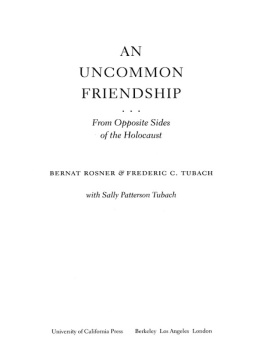


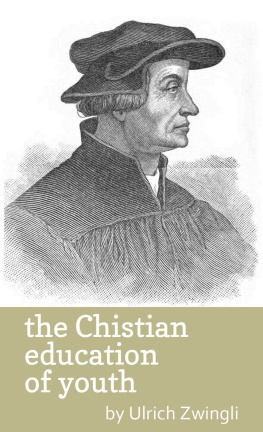
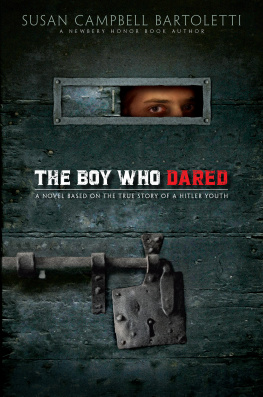
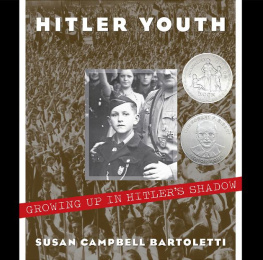
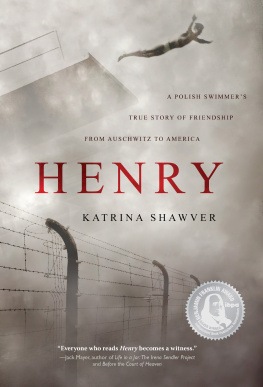


 FREDERIC C. TUBACH
FREDERIC C. TUBACH